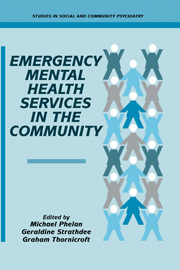Book contents
- Frontmatter
- Contents
- Contributors
- Foreword
- PRINCIPLES AND POLICIES
- 1 The scope and limitations of emergency mental health services in the community
- 2 Service models in emergency psychiatry: an international review
- 3 Users' perspective on emergency needs
- 4 Legal aspects of mental health emergencise
- 5 The economics of mental health emergency services
- 6 Suicide prevention
- 7 Using the crisis
- 8 Community assessment of crisis
- CHALLENGE OF IMPLEMENTATION
- Index
7 - Using the crisis
from PRINCIPLES AND POLICIES
Published online by Cambridge University Press: 28 October 2009
- Frontmatter
- Contents
- Contributors
- Foreword
- PRINCIPLES AND POLICIES
- 1 The scope and limitations of emergency mental health services in the community
- 2 Service models in emergency psychiatry: an international review
- 3 Users' perspective on emergency needs
- 4 Legal aspects of mental health emergencise
- 5 The economics of mental health emergency services
- 6 Suicide prevention
- 7 Using the crisis
- 8 Community assessment of crisis
- CHALLENGE OF IMPLEMENTATION
- Index
Summary
The prevention of relapse and the ensuing crisis is one among many needs of people with a psychosis; it is nevertheless important as each relapse brings with it an increased probability of future relapse and residual symptoms (McGlashan, 1988) as well as accelerating social disablement (Hogarty et al., 1991). Even an ideal combination of pharmacological and psychosocial intervention in the context of assertive outreach does not eliminate the potential for relapse (Stein, 1993).
These facts are not lost on those who themselves experience recurring psychotic symptoms. A survey by Mueser and colleagues (1992) found that patients expressed a strong interest in learning about ‘early warning signs of the illness and relapse’ and was ranked second in importance out of an agenda of over 40 topics. Their thirst for knowledge and understanding on this matter would seem to be driven by a perceived need for control rather than mere curiosity. In a study of ‘secondary’ depression in schizophrenia, Birchwood et al. (1993) found that ‘perceived control over illness’ was the variable most closely linked to depression, more so than illness variables, locus of control or self-evaluative beliefs derived from culture-bound stereotypes of mental illness. Fear of mental disintegration is understood to be among the best predictors of suicide and parasuicide in this population (Caldwell & Gottesman, 1990).
- Type
- Chapter
- Information
- Emergency Mental Health Services in the Community , pp. 116 - 148Publisher: Cambridge University PressPrint publication year: 1995
- 4
- Cited by



